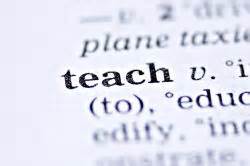Sponsored Links
10 Essential Strategies of an Effective Teacher

TEACHING IS ONE of the professions that can bring about something great if right ideas and beliefs are implemented in the classroom. In many cases, the true purpose of teaching is not actually to teach students how to memorize facts, or how to know all the correct answers. Instead, it is to lead students to understand and apply the concepts being presented.
The following are 10 essential strategies of an effective teacher:
1. Know yourself
Teachers must know their strengths and limitations and the extent of their knowledge of particular topics. It is vital that they have a solid understanding of the subject matter they teach and if necessary, consult other sources of information to aid in teaching.
2. Build positive rapport with students
Communication is very important tool to motivate and arouse students’ interest as it enhances good interaction between the teacher and his or her students. Building good rapport is not necessarily about getting them to like you, but about you endeavoring to understand what they are going through and providing a better foundation for them. (voices.yahoo.com)
3. Set your clear expectations and standards
At the start of the class, make sure that you present your expectations, boundaries and standards in teaching, so that the students would be aware and ready for those matters. Enforced those standards fairly and consistently to be an effective authority.
4. Respect and show motherhood and fatherhood attitude
Teach discipline among students in a manner that a loving parent would do to his or her child. Treat them as your daughter, son, or your little sibling. Doing so would also bring about mutual respect.
5. Encourage students to develop their talents and abilities
Teacher must also be a motivator and facilitator. We need to encourage our students to develop and enhance their abilities and talents. Provide interactive activities where students would participate actively. Train them to be flexible and stimulate them to show their abilities through assigned tasks.
6. Recognize that negative behaviors also serve a purpose
Do not focus on negative behaviors per se, lest you only deal with the symptoms of the problem and not the cause of the issue. For example, if one of your students continuously submits his or her assignment late, try to figure out the reason and help him or her be a good decision-maker.
7. Develop students’ self-esteem
It is necessary that teachers enhance not only students’ knowledge but also their self-esteem and confidence. Actively involve your students in various activities and tasks and give them proper praises for doing good.
8. Develop an emotionally and physically safe place for learning
Safety is typically at the top of most schools’ concerns for students, though the so-called emotional safety is often overlooked. Teachers must be vigilant against bullying. There are things a teacher can do in the classroom to make sure each student feels safe to learn.
9. Build yourself a support system
Avoid people who question your decision to teach well your challenging students. Instead, surround yourself with a network of people who understand your will and motivation, support your aims, and push you to continue improving in your field of expertise.
10. Let your students understand that living is a constant learning process
Let your students know that learning considerably affects their daily living. Relate the topics to their daily lives. Students’ participation must be encouraged. Each student can also bring new insights into a topic or raise questions about a subject that has not yet been considered. Students themselves can identify how the academic topics could be used in their daily lives.
May this simple strategies help every teacher realize the true meaning and essence of our noble vocation as educators.
About the Author:
Luz Leanie M. Reyes, the contributor, is a Grade 8 Teacher of Araling Panlipunan (AP/A.P.) at Nagpayong High School, Pasig City, Philippines. She believes that “There is no end to education. It is not that you read a book, pass an examination, and finish with education. The whole of life, from the moment you are born to the moment you die, is a process of learning.” Her email address is: reyes.luzleanie@yahoo.com.
QUESTION FOR DISCUSSION:
What do you think is the most important characteristic of an effective teacher? Defend your answer.
INTERACTIVE ONLINE ACTIVITY:
In the comment section below, write your short answer to the “Question for discussion”. Ask at least 5 friends (not from your school) to write a reaction on your comment (also in the comment section below, not in Facebook). Print your and your invited friends’ comments and submit the print-out to your teacher.
Tags: Education, Teacher Training, Sociology, Ethics, Philosophy
NOTE
To LEAVE COMMENTS, click first the ‘Like’ button above (if you have not clicked yet).
Use the 'Share' button below or the ‘Send’ button above to invite friends to read this article.
Try our SEARCH ENGINE (upper right section) for your RESEARCH and other tasty articles.




